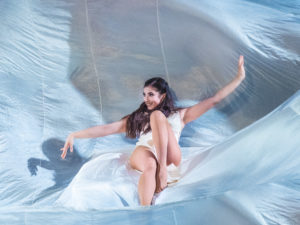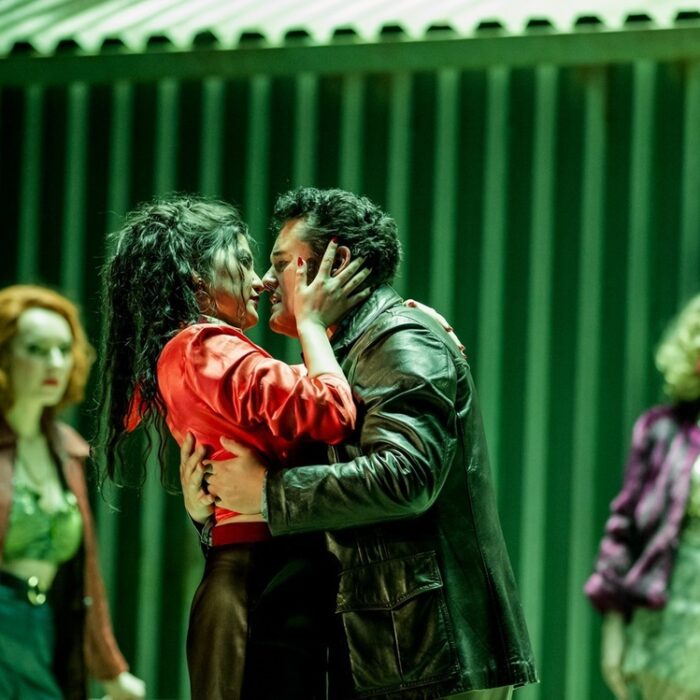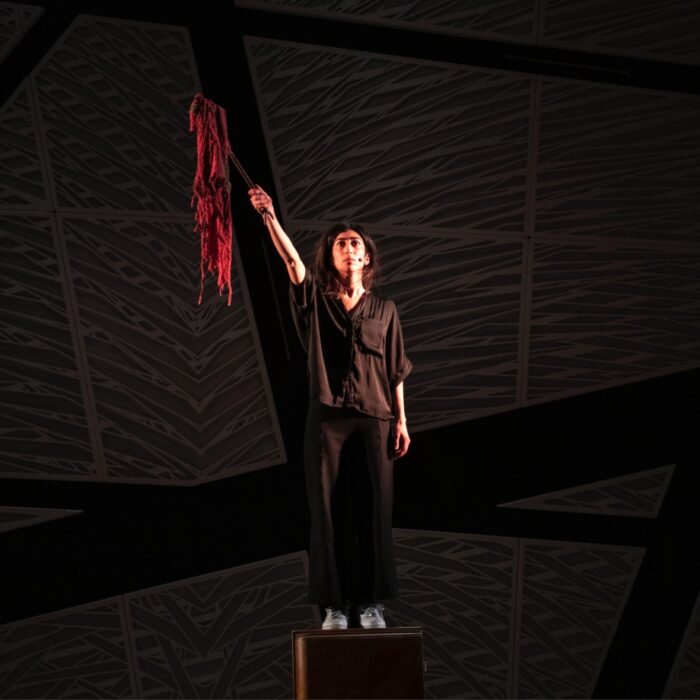
Innsbruck Early Music Festival 2018 Review: Gli Amore d’Apollo e Dafne
A Strong Cast Led By The Scene-Stealing Sara-Maria Saalmann
By Alan NeilsonOne of the highlights of the Innsbruck Early Music Festival is the “Cesti Competion,” for singers specialising in the baroque repertoire. Now in its ninth year, one of the prizes on offer for the contestants who qualify for the final round is the opportunity to sing in an opera at the following year’s festival. It is presented as “Barockoper: Jung,” owing to the young ages of singers, although in most cases it does not reflect their experience, which since their success in the previous year’s competition will have increased significantly. Guilia Bolcato, appearing in this year’s “Barockoper: Jung,” for example, performed at Venice’s, La Fenice in the lead soprano role in Rossini’s “Il Signor Bruschino,” while Eléonore Pancrazi has performed widely in French opera houses, including Théatre des Champes-Elyées, and is scheduled to sing in Glyndebourne Festival Tour this autumn. The high standard of the cast, therefore, allows one the opportunity to see an opera with an enthusiastic young group of talented singers, who are already well on their way to establishing a career for themselves.
This year’s “Barockoper: Jung” is Francesco Cavalli’s “Gli amore d’Apollo e Dafne.” Written in 1640, to a libretto by Giovanni Busenello, for Venice’s first public opera house, the Teatro San Cassiano, it is one of Cavalli’s earlier works and, as such, its style had not yet crsytallised into the form associated with his later operas. Its structure is far looser; the dramatic separation of arias and recitatives is less rigid, and thus the dynamic momentum of the composition possesses a greater degree of thrust. The narrative, in three acts with a prologue, concerns Apollo’s pursuit of Dafne, who wishing to remain free from the chains of love, prefers to be turned into a laurel tree than succumb. Apollo, who has been pierced by an arrow from Amor’s bow, is grief-stricken and cannot accept the loss of Dafne. Touched by his suffering, Dafne admits her love for Apollo, then bids him farewell. Of course, beneath the main drama, and typical for Venetian opera during this period, there are a number of subsidiary narratives, which includes another 22 minor characters. For this presentation by the Innsbruck Early Music Festival, it was therefore necessary for some singers to undertake two, three or even for four parts.
Sleeping & Waking
The director for this production was Alessandra Premoli, who used the prologue as a source for her interpretation of the work. As dawn is about to break, the god Sonno bids his servants to fill mankind’s minds with dreams, infusing them with symbols and visions, and turning shadows into beasts. It is the time when reality becomes blurred and is in a state of flux. Premoli’s characters, therefore, tread the narrow path between sleep and wakefulness. Shadows in the form of projections against a white-clothed background, and shadowy figures, who double the main characters, lead, terrorize or reflect their semi-conscious states. The drama is set in a hospital of sorts. Dafne lies in a bed in a deep sleep, or coma, while the drama begins to unfold around her. As she becomes partially conscious, so reality continues in a dream-like way, happiness giving way to panic, with bizarre happenings, such as her transformation into a laurel tree, with shadowy visions and apparitions everywhere. It was an excellent idea, that bonded itself to the text seamlessly, and produced an engaging presentation.
The costumes, designed by Mariana Fracasso, were simple, but effective and mainly in white, from an indeterminate period, contrasting and complementing nicely the sometimes dark, sometimes bright ambience of the sets. Apollo stood out, having more colourful, more clearly defined attire, giving him the appearance of a pop star, of someone accustomed to adoration. The scenery, on the other hand, was not particularly successful. It had a perfunctory quality to it, and made one think of amateur dramatics, rather than a professional theatre. Although to be fair and thanks to the rain, the performance, originally programmed to be performed outside in a courtyard, had to be moved inside, into a university hall, which probably exacerbated the amateurish appearance of the staging. The shadow theatre was created by alTREtracce. The three actors, dressed in white 18th century costumes and masks, as if attending the Venice carnival, acted out their roles with style, their movements subtly choreographed to shadow or engage with the singers. A particularly memorable image was of Dafne taking the shape of a double bass and being played by a shadow actor, his movements coordinated to match her coloratura.
Stealing the Show
Musically, this was a production with much to admire; all the singers showed quality, and were supported by a pleasing performance from the musicians of the orchestra, Accademia La Chimera, under the baton of Massimiliano Toni, who produced an vibrant reading, and elicited attractive textures from the score. Although always cognizant to the needs of the singers, Toni did not allow the orchestra to be relegated to a subservient role, but kept the it on an equal footing.
Without doubt the outstanding performance of the evening came from the soprano, Sara-Maria Saalmann, playing the role of Dafne. Dressed throughout the evening in a white hospital gown, Dafne slips and slides between her waking and sleeping realities, as she engages with Apollo’s attentions, and those of other characters. She makes her entrance in the middle of Act one; waking from her hospital bed, she is happy and joyous, and dances with the nymphs. From her first line “O più d’ogni ricchezza” the beautiful quality of her voice was apparent; lines were smoothly and joyfully enunciated, full of subtle embellishments. It is a long and demanding scene in which Saalmann’s voice is required to sparkle, and indulge itself in a colorful display of vocal gymnastics – and she did not disappoint. She danced nimbly across the score with grace and flexibility, raced nimbly up and down the scales in scintillating coloratura displays, which always erred on the side of charm; her phrasing was delightful on the ear, characterized by clarity, nuanced variations in tone and dynamics, and above all, by the wonderful flexibility of her voice. As the drama progressed, so the dark side of her semi-conscious dream-state started to impose itself, and her anxiety and fears began to become more pronounced. Shadows wrapped themselves around her, and Apollo’s attentions became oppressive. Saalmann captured Dafne’s changing emotional state wonderfully, infecting the vocal line with a greater degree of agitation and disquiet in a fine expressive display. The opera closes with the aria “Assai son soddisfatta, anzi mi pento” in which, she swears eternal love for Apollo, and bids him farewell in a plaintive rendition, tinged with regret. Although there appeared to be a element of tiredness creeping in towards the end, it was certainly understandable, and did little to detract from her excellent performance.
Power & Beauty
Apollo, played by the counter-tenor, Rodrigo Sosa dal Pozzo, struts his way onto the stage at the start of Act two, a god very much impressed by his own beauty and power. Dal Pozzo gave an excellent physical presentation of Apollo, with long blond hair, open shirt and the obligatory tight trousers. Who could resist him, apart from Dafne, of course? His singing was also impressive, if not completely so; he displayed intelligence and skill in crafting phrases, with particular attention given to dynamic and tonal infections, and produced an expressive portrayal of the god. His lament, “Misero Apollo I tuoi trionfi or vanta” in which grieves for his loss of Dafne was beautifully rendered and captured Apollo’s sadness. On the negative side however, dal Pozzo’s singing appeared to veer away from taking risks, and this conservative approach occasionally showed itself in his underperforming certain parts, unlike Saalmann who was happy to push herself to higher levels. Not too much should be made of this, as overall it was a good performance.
Shades of Grey
The Italian soprano, Giulia Belcato, played the role of Amore, who fires the arrow which enflames Apollo with love for Dafne. In this production Amore is portrayed as a nurse, whose arrow is a long needle, which she injected into Apollo. In dreams, such characters are never one dimensional, and this nurse, maybe a far darker figure than she first appears to be, for she has black wings, suggestive of the “angel of death,” rather than just a commonplace angel. Bolcato played the role well, infusing it with just the right amount of ambiguity and fun. Vocally, she brought presence to the role; her voice is strong with a crystalline complexion, although it can at times have a sharp, piercing quality. It is, however, flexible, with a pure and clear luster, which she used creatively in an expressive reading of the part.
The tenor, Juho Punkeri was excellent in the roles of Titone, Cefalo and Pan. As the aging, but immortal husband of the perpetually young goddess, Aurora, Titone was always going to find it difficult, and Punkeri’s essaying of the role left you in little doubt that he is in for a life of eternal misery. He was every bit an old man, long white hair, long white beard, unable to keep up with his young wife. As Cefalo, who is Aurora’s lover, he is a completely different person, young, virile, ardent and jealous. It was a nice directorial conceit to have the same actor play both the husband and the lover, and Punkeri’s acting skills allowed it to work well. He also sang well. His voice has a pleasing timbre which he employed with skill and finesse; his phrasing was always furnished with subtle embellishments and dynamic shadings. As Cefalo he was able to inject an urgent ardent characteristic into the voice, which obviously was not present when portraying Titone.
In the roles of Procri, a nymph and a muse was the soprano, Deborah Cachet. Having been betrayed by Cefalo who has taken up with the goddess, Aurora, Procri sings of her pain in the closing scene of Act one: Cachet wrapped every phrase with a heartfelt sadness, using her expressive voice to spin out long melancholic lines which perfectly captured the pain that she was feeling. In fact, throughout the evening, she put in a persuasive performance, founded upon her strong, evenly-balanced voice.
The mezzo soprano, Isabella Rejall, playing the parts of Venere, Filena, a muse and a servant of Sonno – Itaton, displayed excellent acting skills in clearly differentiating the four characters, as well as putting in a convincing vocal performance. She possesses a clear, flexible voice, with a pleasing tone, which she is able to vary with an array of rich colours, which allowed her to clearly define her very different roles. She was most successful and forceful in her role as Filena, who moves from simply offering advice to Dafne, to almost terrorizing her. Her voice is certainly very strong across the whole range, but despite its colorful textures, she occasionally sounded a touch too monochromatic and her upper registered sometimes a bit harsh. Otherwise, it was a very impressive performance.
Andrea Pellegrini made an excellent impression in the roles of the father of the gods, Giove, Sonno, the god of sleep, and Dafne’s father, the river god, Penèo. Pellegrini authoritative bass perfectly captured their status as gods. His voice strong, clear, with a rich dark color.
The tenor, Isaiah Bell, played the roles of a shepherd, Sonno’s servant – Morfeo, and Cirilla. It was in the latter role of Cirilla that Bell was given the space to display his ability. Cast as cleaning lady in the hospital, Bell enjoyed hamming it up as a woman, which he did in fine style. He backed up his excellent acting, with a solid singing performance, in which he evinced thought and intelligence, phrasing his lines with an interesting array of a dynamic and rhythmic accents.
In the roles of the wise Alfesebio, a shepherd and Panto, a servant of Sonno was the bass, Jasin Rammal-Rykala. He made a good impression; he has a strong, colorful voice, which he employed with flexibility and subtlety.
Unfortunately, soprano Eleonore Pancrazi, who was playing the roles of Aurora, a nymph and a muse was unfit to sing on the evening of the performance. She was, however, able to mime the role of Aurora, which she accomplished with great skill, portraying her as a good-time girl, always on the look out for the next man, unfortunately for her eternal, yet aging husband, Titone. The roles were ably sung by the other two sopranos in the cast, Giulia Bolcato and Deborah Cachet.


